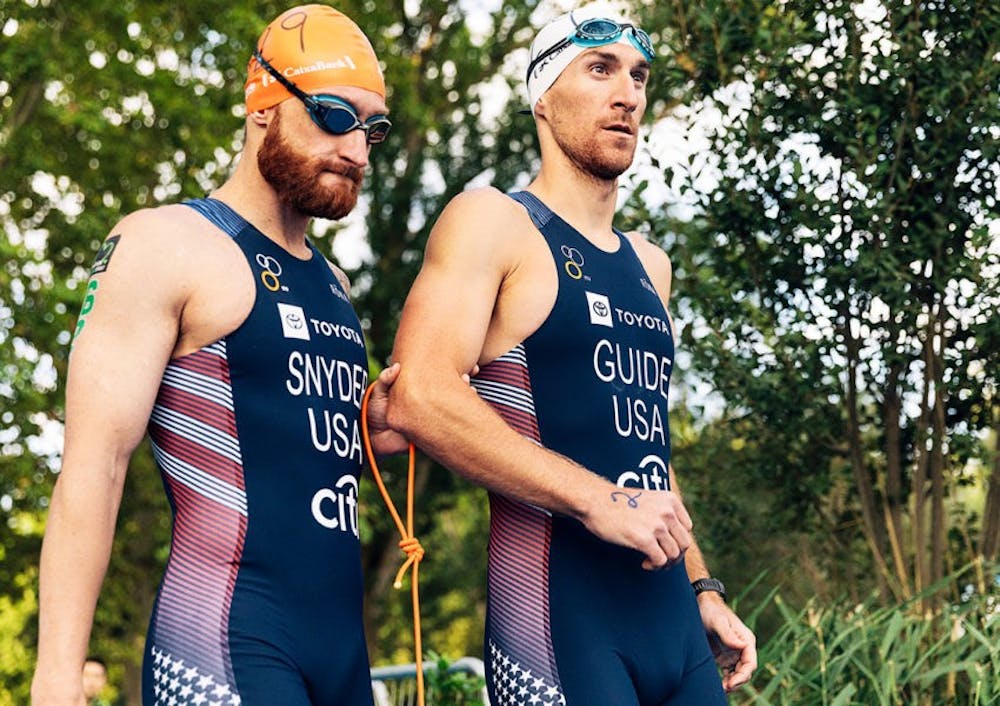For retired Navy explosive ordnance officer, two-time Paralympian, and current Princeton Ph.D. student Brad Snyder, adjusting to life with blindness required him to draw on resilience ingrained during his time in the Navy.
“I’ve been able to figure out a lot of crazy things, from jumping out of aircraft to scuba diving and all of that stuff I used to do in the Navy,” Snyder told The Daily Princetonian. “I can figure out blindness.”
Deployed to Iraq and Afghanistan in the midst of the War on Terror, Snyder’s daily operations primarily revolved around being a part of the Navy’s “bomb squad.” On Sept. 7, 2011, Snyder stepped on an improvised explosive device and sustained a complete loss of vision in both eyes and significant facial damage.
Now living with prosthetic eyes, Snyder has not merely learned to live with blindness — he’s reached the pinnacle of athletic achievement as a Paralympian.
Snyder made his Paralympics swimming debut at the London 2012 Paralympics, which occurred only a year after his injury. Winning gold in the 100-meter freestyle and 400-meter freestyle events, and silver in the 50-meter freestyle event, Snyder’s London 2012 experience was extraordinary both in and out of the pool.
“It was very inspiring to be around all these athletes who had major life challenges — disabled athletes and wheelchairs, paraplegics, people missing hands, missing limbs — and it is not a defining characteristic for them. It’s merely the way they compete,” Snyder said.
“To be able to compete and win was [another] thing,” Snyder continued. “There was a feeling of realizing that childhood dream of being on the Olympic team. I was on the Paralympic team, but the feeling was very much the same.”
That transition — from his recovery at a Veteran Affairs facility near his hometown of St. Petersburg, Fla., to winning five Paralympic gold medals — would not have been possible without his strong support system, including his mother Valarie.

“I actually gave one of my gold medals to my mom. We had survived this major traumatic transition. My mom was there almost every step of the way,” he said.
In fact, his mother presented the idea of swimming in the Paralympics to Snyder in the first place. It was never Snyder’s immediate goal after becoming blind to return to the swimming pool (he was a collegiate swimmer at Navy), but rather an idea that some friends presented to him a few months into recovery.
“I recognized that [swimming] was my opportunity to sort of go back to normal, show everyone everything’s going to be fine, give people a sense of peace and confidence in my new reality,” Snyder said of his first few times back in the pool.
“More than doing a job, much of our identity revolves around what our profession is, what our contribution to society is,” Snyder added. “I knew all of those things were really dramatically changing in a short amount of time, it’s a lot to deal with. And so as a way to sort of begin that process, sports was a way for me to sort of reclaim my identity and start from the beginning.”

As he reentered the pool, Snyder received a call from a friend at the United States Association of Blind Athletes in Colorado Springs, Colo. The organization works to recruit blinded veterans to compete in sports and was able to arrange for Snyder to leave the recovery hospital for training opportunities, in preparation for Paralympic qualifying meets. After a few months of training, while simultaneously completing vision rehabilitation, Snyder flew to Colorado Springs for a meet, where he qualified for the 2012 Paralympic U.S. National Swimming team.
From there, Snyder has gone on to win six paralympic golds, including a paratriathlon gold medal at the 2020 Tokyo Paralympics. Snyder also has three gold medals in International Paralympic Committee World Championships, winning all three in freestyle swimming events in 2015.
Past the Paralympics, Snyder’s ultimate commitment to service has motivated his next career move — pursuing a Ph.D. at Princeton as part of his goal to become a professor at the Naval Academy. After teaching as a fellow in the leadership and ethics department at the Naval Academy, Snyder knew that the classroom could be a potential career option.
“What I saw when I went to the Naval Academy was twofold,” he said. “One, [teaching] was a job I could really effectively do, as my constraints as a blind person are really not as relevant in the classroom as they are in other places. I also felt like at the Naval Academy, I’m serving this really important population of people, who want to be leaders in the U.S. Navy.”
Now, as Snyder has met all the requirements for a Princeton Ph.D., Snyder, his wife Sara, and their one-year-old daughter Rooney are eyeing a move to Annapolis, Md., where Snyder will write his dissertation from the Naval Academy. Once that is complete, Snyder will apply for a faculty position at the Naval Academy where he hopes to teach for the remainder of his career.
As for the 2024 Paris Paralympics?
“I’m taking a sabbatical,” Snyder joked. “I had every intention of competing in Paris, but it’s gotten to be too much doing dad duties and a Ph.D., so I’m going to sit out the road to Paris.”
“But my intention is to come back and compete for a spot on the Los Angeles team for the 2028 games, and that will certainly be my last go around,” he added.
“There is an internal desire to reclaim for myself the agency I had towards making the life I wanted,” Snyder said. “I’m an ambitious person, and I’m not going to hide from that. I want to make an awesome life for myself and for my family.”
Cole Keller is an associate editor for the Sports section at the ‘Prince.’
Please direct any corrections requests to corrections[at]dailyprincetonian.com.








